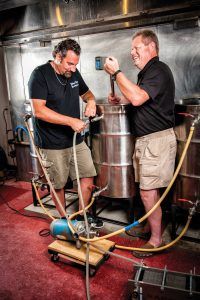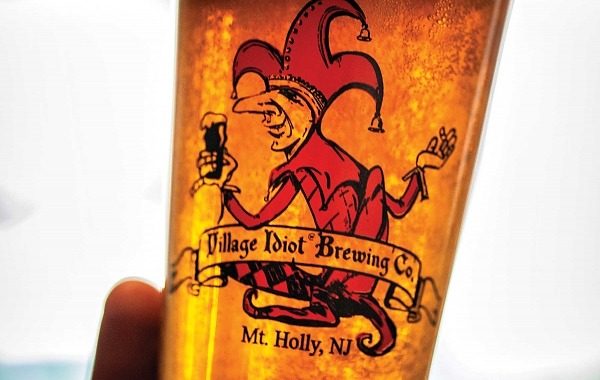On High Street in Mount Holly, a vacant tavern is reborn with hometown brews and local pride. In an historic airfield in Millville, a small taproom emerges inside an old hangar, where the hum of brewing is drowned out only by helicopters and the occasional prop plane.
Across SJ, dozens of homebrewed dreams inch ever closer to reality in ways that would have been unthinkable only a few years ago. This is the new landscape of New Jersey craft brewing; a sudsy world shaped by bill S-641/A-1277 (nicknamed the “Small Brewery Bill”), which now allows small-batch breweries to sell directly to customers in taprooms designed for tasting.
But unlike the microbrewery restaurants that exploded around the country in the ’90s, the small brewery law restricts this new generation of craft brewers from serving food. The result: hyper-local boutique breweries, most open only for a few hours a day, a few days a week. Of course, for guys like Rich Palmay and Vince Masciandaro of Village Idiot Brewing in Mount Holly, and Paul Simmons of Glasstown Brewing Company in Millville, it’s the fulfillment of a dream that began fermenting the first time they combined water, yeast and sugar in their home kitchens – just to see what would happen.
“When home brewers get together, you talk about different brews and you talk about geeky beer stuff, but then nine times out of 10, you start talking about ‘Boy, wouldn’t it be great to open a brewery?’” Palmay says.
Such was the regular conversation between Palmay and Masciandaro, who met over beers at Barley Legal, SJ’s largest homebrewers’ club. If brewing is both art and science, then Palmay (a former communications consultant) is the art, and Masciandaro (still a civil engineer) is the science. But the two men found they had much in common – temperaments, brewing styles and houses only a few miles apart, in Medford and Evesham. They began brewing together, critiquing and sampling, and when they heard of proposed legislation to change the law for small craft brewers, they helped rally their fellow amateur brewers to the cause.
Few were better poised to open a brewery when that law changed in June 2012, but it still took the better part of a year and a half to create a business model, find financing, secure a location and begin brewing. After original plans to locate in Medford fell through, the two toured Mount Holly and discovered the empty Bridgetown Pub right in the middle of town, with copper bar top still intact. They took it as a sign and signed a lease.
“We don’t want to be a big name, 20-barrel behemoth,” Palmay says. “We would rather be a small-batch, artisanal, hand-crafted beer with a main street location and bring craft beer to the people.”

Vince Masciandaro and Rich Palmay of Village Idiot Brewing
Village Idiot sells beers by the sample, by the pint and by the growler – brown glass jugs with the name of the brewery on one side and Mount Holly proudly inscribed on the other. Since opening its doors during the holiday season in December 2013, Village Idiot has served up a couple dozen beers, from the clean, crisp flavors of the Bridgetown Blonde to the decidedly different Ask Kermit Cucumber Cream Ale (not recommended for people who don’t like significant cucumber flavor in their beer). Several have proven popular with the crowds that come into the tasting room on Thursday, Friday and Saturday nights, enough to slightly worry Masciandaro. He doesn’t want to brew the same thing over and over for customers who expect it. He wants to try something new.
So far, the experiment seems to be working in Mount Holly. It’s good branding for the city, says Director of Economic Development Joshua Brown. It brings people in. It supports nearby restaurants, since Village Idiot can’t sell food. And there are other fringe benefits for downtown denizens as well.
“I get my growler filled every week,” Brown says.
Glasstown’s Paul Simmons has worked in restaurants and bars since he started bussing tables at age 16, tending bar through college and through his years working as a consultant. A home brewer, he knew exactly what the law change meant for his chances of opening a brewery.
“If it was not for the change in the law, we would not be here,” Simmons says. “You simply need too much money to do enough volume and buy enough equipment to compete in keg sales or bottle sales with the bigger breweries.”
What you can do is invest, just enough, in small, second-hand equipment – a small step above a home brewing operation – and find a location where you can set up a comfortable tasting room with a modernly retro vibe. That’s what Simmons found at Millville Airport, where nearly 1,500 pilots trained on P-47 Thunderbolts during World War II, and where Cooper University Hospital now maintains its medical evacuation helicopters.
It’s a good space, and one where he’s able to grow, already reinvesting in a larger three-barrel copper brew house that will nearly double his capacity. Unlike Village Idiot, which makes its beer available only in its own taproom, Simmons is actively working to get Glasstown beers on tap in local restaurants.
As a brewer, Simmons is a tinkerer, not a researcher. He’d rather follow his instincts and brew a batch, take notes and make corrections as needed. Happy mistakes are part of the process. His Founder’s Ale, originally intended to be a West Coast Red, had a little too much chocolate malt in the original recipe. But people liked it, so it stayed. Other beers, like the Nightcap Belgian Blonde, are light and subtly fruity, with hints of banana and clove. And his recently debuted 609 IPA [India pale ale] will likely take over for the IPA he had on tap when he opened.
Still making his way through his first year, Simmons admits there’s much to learn about brewing, branding and timing. (He was surprised to find pumpkin beers on local shelves in mid-summer, before he had even made plans to start brewing.) But local customers – some who come in several times a week to get growlers filled, others who arrive when Facebook announces the return of cult favorites from his roster of about 25 beers – tell him he’s doing something right.
“We’re here to do something better,” Simmons says. “That’s the whole point of being a craft brewery. We’re not here to make something that’s already on the market. We’re here to make something different.”
Glasstown and Village Idiot are the first route markers on a trail of craft breweries that doesn’t quite exist – yet. Many breweries remain in various stages of planning, some waiting only for final pieces of paperwork before they can open their doors. Within the industry, there’s a strong sense of camaraderie and cooperation, a belief that a rising carbonated tide will surely lift all boats.
That’s certainly the belief of Gene Muller, founder of Flying Fish Brewery in Somerdale, dubbed the “patron saint of craft brewing in New Jersey” by the guys at Village Idiot, a sentiment that only one brewer in New Jersey takes exception to.
“How can I be a patron saint if I’m still alive?” Muller asks.
Until recently, it wasn’t much work being the spiritual leader of local brewmeisters. Last year, New Jersey ranked 48 among all 50 states for breweries per capita, according to the Brewers Association. That’s a status Muller would like to change, and based on what he tasted during the 18th annual Garden State Craft Brewers Guild Beer Festival onboard the Battleship New Jersey, he believes there’s much potential to do so.
“I liked the Village Idiot beers,” Muller says. “Glasstown had a really nice IPA. I think they’re bringing a lot of energy and excitement to not only the guild but also the state.”
That growth continues in fits and starts. Mount Holly will become the first town in the state to boast two breweries with the opening of Spellbound Brewing. Glasstown hoped to become a similar draw with nearby Turtle Stone Brewing in Vineland, before that brewery abruptly stopped producing. (Barley Legal’s website pronounces them “maybe closed,” though even in the tight-knit world of the local brewing industry, few people know what happened.)
Will this craft brew movement lead to crowds of curious tourists or remain a mostly local pursuit? Will local taprooms soon boast mostly local beers? This early in the brewing process, no one is quite sure. The ingredients are in place. What they’ll become is a question that will be answered through a process that’s a bit art, a bit science but mostly time. “It’s not even for us to decide,” Palmay says. “I think we’ll be led to a path.”












